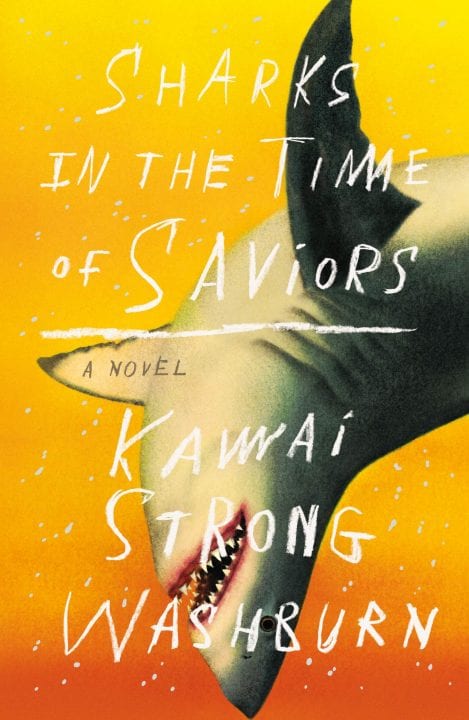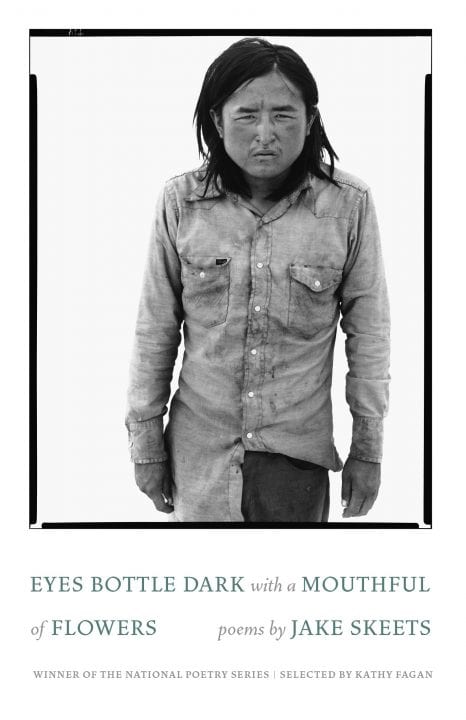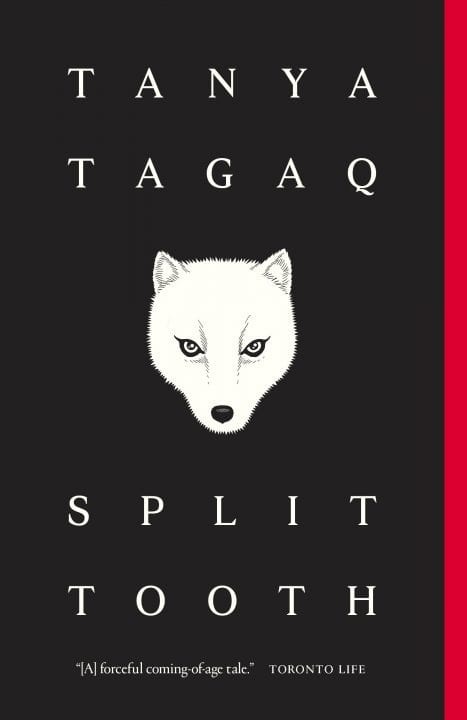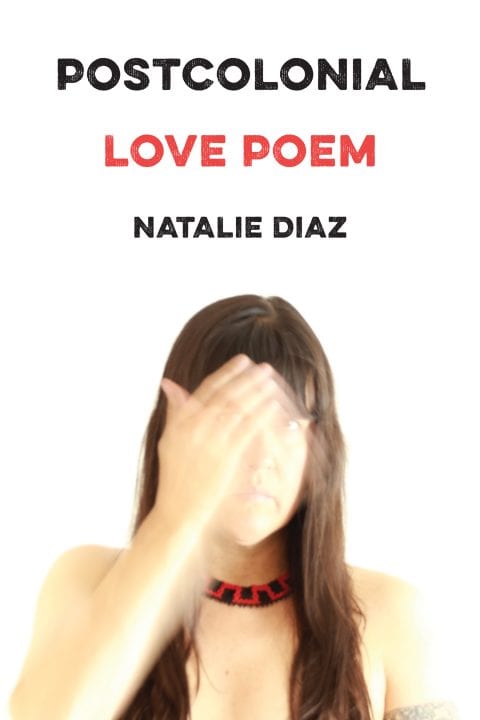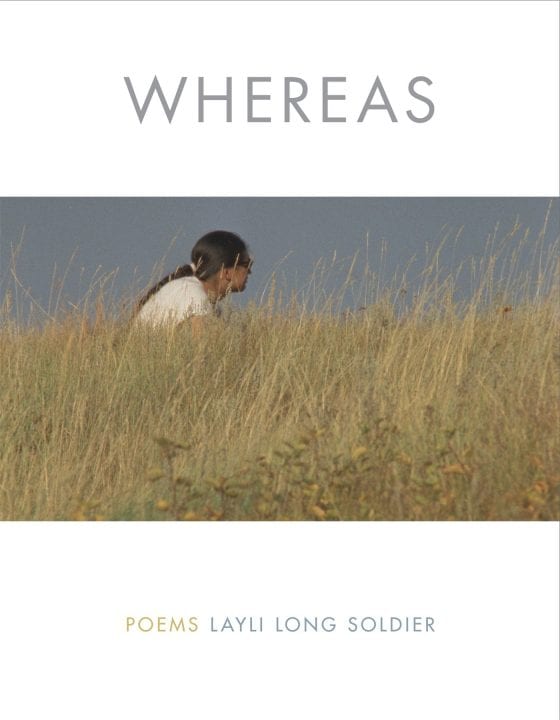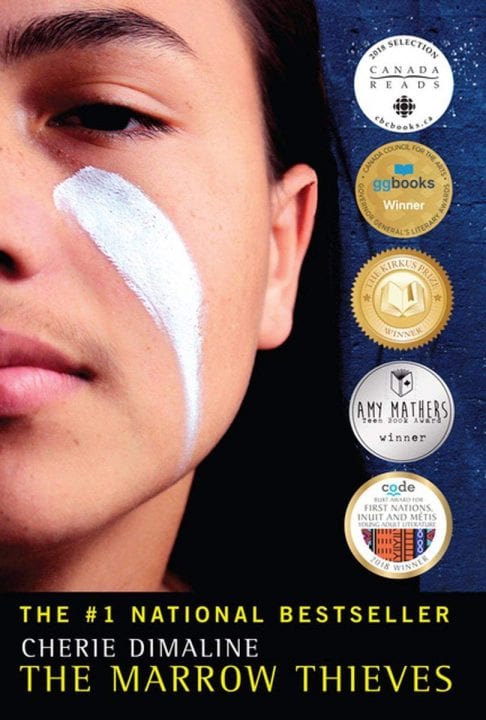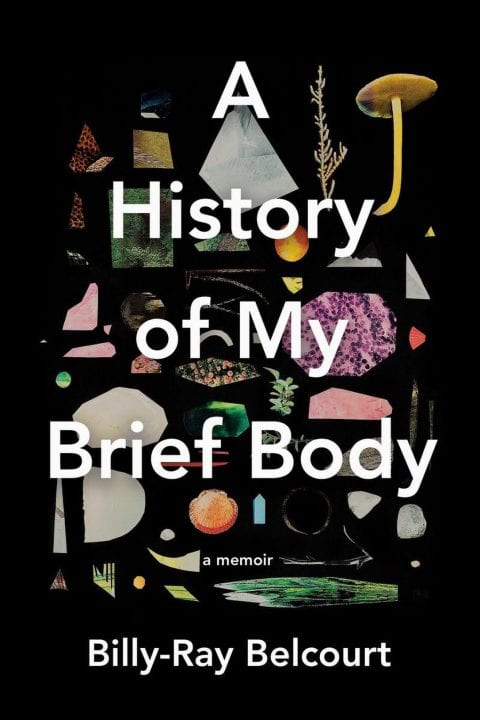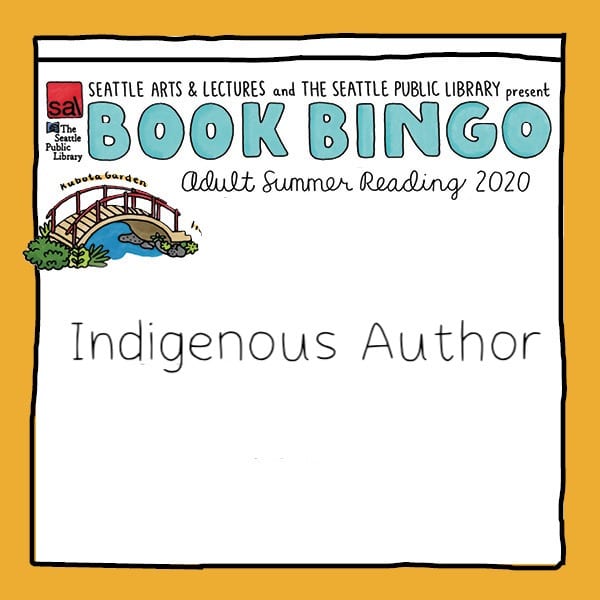
Summer Book Bingo: Books by Indigenous Authors
August 19, 2020
There are only three weeks left to play Summer Book Bingo, our free summer reading program with The Seattle Public Library, so be sure to get your card! Engage with other bingo players and find out their own reading adventures by using the hashtag #BookBingoNW2020 on social media.
During this country’s history, 573 Tribal Nations negotiated with the U.S. government, exchanging the land of this continent for basic needs, yet the U.S. broke every one of those treaties. Reading is a powerful tool that can help us acknowledge the debt of that ongoing mistreatment of American Indians, Alaskan Natives, and Native Hawaiians—and while we should be reading books by Indigenous authors all year long, your “Indigenous Author” square is a good chance to add new titles to your collection.
In this post, Piper Daugharty, our WITS Program Associate, gathers some of her favorite books by Indigenous authors to explore moments of joy and resistance, of trauma and healing, in the wake of apocalypse.
By Piper Daugharty, WITS Program Associate
Lately, I hear the word apocalypse thrown into casual conversation. It feels right. We’re living through and within a global pandemic, one that affects communities in unequal ways due to rampant white supremacy within our institutions. We’re living through continual gaslighting from American media, through a time when truth and storytelling is muddied and controlled. We’re reconsidering individual and collective roles in necessary social uprising, and watching our government descend into blatant fascism. Elissa Washuta (Cowlitz) writes, “Maybe my triggers are many because to live in the United States of America is to wake up every day inside an abuser.” Terms like abolition, white fragility, radical Black joy are suddenly circling into white communities, as if these are novel ideas unique to our moment. Land back. Defund. Divest. Re-distribute.
But “know that, if you are not from a post-apocalyptic people, you may not be familiar with these strategies we use to survive,” writes Washuta in her essay “Apocalypse Logic.” She explains, “Apocalypse has very little to do with the end of the world and everything to do with vision that sees the hidden, that dismantles the screen.” These “apocalypse” conditions we’re experiencing may be new in some ways, but in many others, they are as traditional as our constitution, our shared ideologies, our America. They are simply exacerbated, made visible to those in privileged positions, and suddenly felt by the perpetual “majority.” Reframed in this way, can we welcome this apocalypse?
Layli Long Soldier (Oglala Lakota) wrote in a Lithub essay in response to George Floyd’s murder, “On this land, our histories overlap, but in some ways, they are distinct.” In an ongoing apocalypse, we should also turn to Indigenous writers to reconsider how whiteness is entrenched in violence, historically, and how wealth perpetuates that violence today. In Seattle, we are on Coast Salish and Duwamish territories, and I recommend paying real rent. When white people continue to ask “What do I do?” as if helpless, knowing that resources and research are readily available, Washuta answers, “Remove your settler state from this land and restore all governance to its forever stewards.”
These are books filled with joy and resistance, infused with re-told histories of violence and rebellion, of trauma and healing, of ancestry and visions, of cracks of light creating a future of hope.
Fiction:
Love Medicine by Louise Erdrich (Anishinaabe)
This novel-in-stories began my great love affair with Erdrich, whose rich, poetic prose moves us from generation to generation, back and forth in time. It doesn’t map, it weaves. Erdrich doesn’t delineate, she encircles. Embedded in this book are the quiet histories of boarding schools, violence perpetuated by nuns and priests, as families grapple with the fall out from years of religious and state-sanctioned removal and subjugation. Within these spaces, both familial and public, resistance births resilience births joy.
This Accident of Being Lost by Leanne Betasamosake Simpson (Nishnaabeg)
If anyone asks, “What, are we just supposed to give the land back? What does that even look like?” hand them Simpson’s book. A collection of fragment, poetry, song, story, and rebellion, Simpson’s vision embodies agency, collective change and decolonization. In one story, an Indigenous woman takes a course on gun safety surrounded and taught by white men. In another, a woman keeps texting Lake Ontario, begging her not to overrun and flood the colonizer town. A deer licks salt by a river. These stories resist and twist our understanding of narrative, and creating in their wake this fragmentary blend: science fiction becomes our future realism.
Honorable Mention:
Sharks in the Time of Saviors by Kawai Strong Washburn
Washburn isn’t Native Hawaiian, but his prose feels reminiscent of other Hawaiian writers like Kristiana Kahakauwila or Kiana Davenport, and this novel breathes underwater. Heavy, lyric, haunting, frenetic, feral—the way each character speaks in this novel urges us towards what we feel is both unimaginable and inevitable. When, at a young age, a boy falls into the water and is saved by sharks, his family begins to realize his special connection to the old ways and the old gods. “Money was the name of that (new) god, and it was the sort of god that preyed on you… and we still pray to it now,” explains his mother, who has watched her home descend into a “tourist paradise” that forcibly removed people from their way of life, their traditions, and forced poverty on Indigenous communities. I’ve never read a more perfect novel in scope, lyricism, or urgency.
Nonfiction:
My Body is a Book of Rules by Elissa Washuta (Cowlitz)
Washuta, a graduate of UW’s MFA and a former Hugo House fellow, upends form and fragment in this collection of essays on body dysmorphia, sexual trauma, PTSD, and mental health. She writes bitingly, humorously, hysterically, manically—and each essay takes a form that only makes sense for the subject. Washuta’s innovation of the lyric essay takes shape in juxtaposing a made-up Q & A from Cosmo’s sex column with revised Bible testaments, a Match profile with footnotes of brutal, honest self-critiques, a Preliminary Bibliography completely co-opted by the urgency of a sexual assault survivor’s bottomless dread. I recommend this book to all the young women in my life. Washuta’s next book, White Magic, debuts from Tin House in 2021, and I also highly recommend following her on Twitter for hot takes and delightful TMI.
As We Have Always Done by Leanne Betasamosake Simpson
I can’t emphasize how obsessed I am with Simpson’s work, but this scholarly-poetics book changed the way I saw the world. The way Simpson resists pedantic academic language to privilege a body-poetic, and the way she challenges gender, sexuality, health, economics, and all of our institutions as colonial constructs of violent histories and present settler states—I have to read and reread and reread. These are lessons for living. When she came to UW last year, the first thing she said to the audience was, (and I paraphrase), “Can you hear and feel the cedar trees, here? The porches and fences and buildings. They’re so devastated.” I can’t wait for her next book, Noopiming: The Cure for White Ladies, coming out in September.
Coming Soon:
Red Paint by Sasha LaPointe (Upper Skagit, Nooksack)
LaPointe is a Coast Salish writer, from the Upper Skagit and Nooksack Indian tribes. I can’t wait for her first book, Red Paint, to come out from Counterpoint Press in 2021. Red Paint is a memoir of resilience through lineage, of historical traumas both experienced and passed down, a journey of excavation. LaPointe writes of finding her voice “against the mostly male, mostly white backdrop of the Seattle punk scene,” and at the heart of this story, lineage and history collide with love, survival, and strength. LaPointe, riot grrl at heart, also has a book of poetry coming out with Milkweed in 2021.
Poetry:
Poetry books I’m reading for #thesealeychallenge (31 days of poetry books for 31 days of August) and next on my list:
Eyes Bottle Dark with a Mouthful of Flowers by Jake Skeets
Split Tooth by Tanya Tagaq
Instruments of True Measure by Laura Da’
Postcolonial Love Poem by Natalie Diaz
Whereas by Layli Long Soldier
The Marrow Thieves by Cherie Dimaline
A History of My Brief Body by Billy-Ray Belcourt
If you want to know of the place you live, look to the original stewards of the land. Washuta writes, “I don’t know of a chinuk wawa word that translates exactly to whiteness, maybe because we experience it not as an abstract noun but as an action verb. None of us can choose the legacy we are born within, but all of us choose alliances. We make and reinforce our commitments with every action.” This might be a new apocalypse, but what will we see? What screen is being pulled back? Who are we listening to?
Would you like more suggestions for your “Indigenous Author” square? Check out The Seattle Public Library’s suggestions here.


